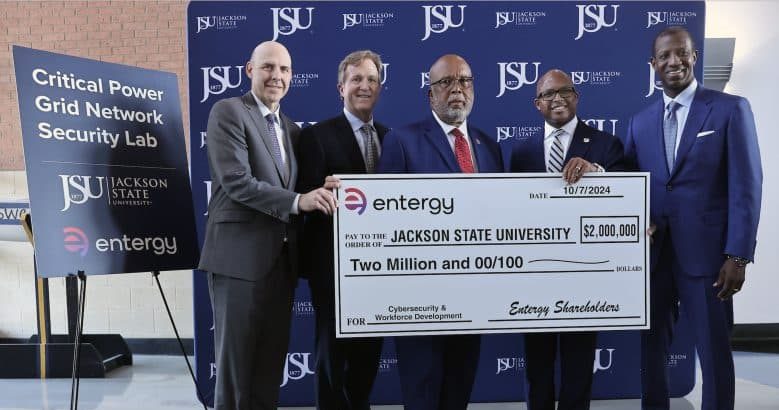Jackson State University will be granted a total of $2 million over the next five years to fund the creation of an innovative hub to train a skilled workforce to meet the growing security needs of nuclear, electric, and natural gas companies, and electrical cooperatives.
The funding is being made available through the Entergy Charitable Foundation. Officials are calling the hub the Critical Power Grid Network Security Lab.

“I am honored to receive this generous grant on behalf of Jackson State University. This gift will have a lasting impact on the lives of our students and the future of the energy sector,” JSU President Dr. Marcus Thompson said. “Looking ahead, this lab will not only benefit Jackson State University and our students, but it will also play a critical role in shaping the broader energy landscape.”
The Power Grid Security Lab project will be a cornerstone of JSU’s commitment to workforce development, energy infrastructure, and cybersecurity. The lab will provide students with real-world experience safeguarding critical power grid infrastructure. As cyber threats become more sophisticated and aggressive, a robust defense system in the energy sector will also have to advance.
“Whether using computers to earn a college degree or checking out at the grocery store, electricity isn’t a luxury for most people; it’s a necessity. And so is thwarting cyber threats in the energy sector,” Entergy Mississippi President and CEO Haley Fisackerly said.
“The robust growth in our company and the state is providing extraordinary opportunities to help build a diverse and skilled workforce in the cybersecurity field. Through this partnership, we’re investing in local talent and competing to keep them here. For more than 100 years, we’ve served communities alongside Jackson State University, and we’re proud to continue powering the bright minds they produce.”
The lab aims to equip students with valuable technical skills and contribute significantly to society by fostering a workforce prepared to protect vital national infrastructure.
As things stand, the demand for skilled professionals in these fields far exceeds the available supply. There was a reported shortage of approximately 3.4 million cybersecurity professionals worldwide in 2022, with over 700,000 job openings in the U.S. alone.
This shortfall poses a significant challenge to national security and the economy as organizations struggle to defend against increasingly sophisticated cyberattacks. Studies show that global cybercrime costs are expected to reach $10.5 trillion annually by 2025, up from $3 trillion in 2015, highlighting the escalating severity and frequency of cyberattacks.
JSU and Entergy hope to remedy this growing issue with their new campaign.







